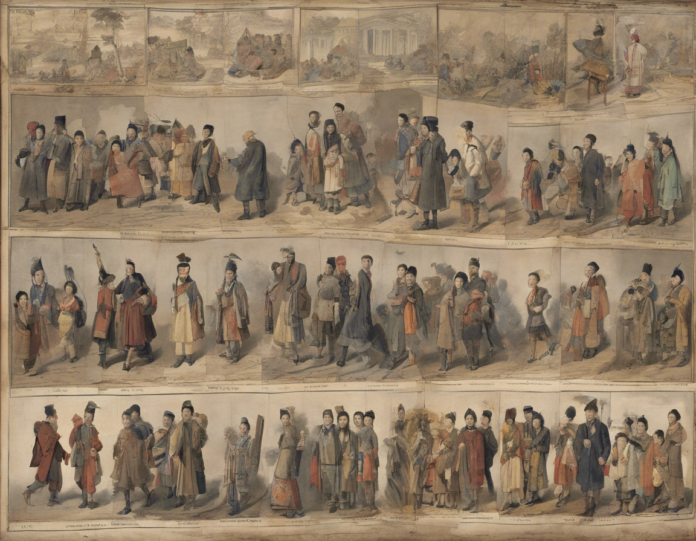Throughout history, interactions between different cultures have played a crucial role in shaping the world as we know it today. The exchange of ideas, technologies, goods, and practices between different civilizations has led to remarkable advancements and transformations in various domains. In this comprehensive article, we will delve into the history of foreigners and how their presence has influenced societies across different time periods.
Early Encounters: Ancient Civilizations and the Exchange of Ideas
During the ancient times, interactions between different civilizations were not uncommon. The Silk Road, for instance, facilitated the exchange of goods between the East and the West, leading to the spread of various commodities and ideas. Foreign traders and travelers played a significant role in this exchange, as they introduced new products and technologies to distant lands.
The Phoenicians, known for their seafaring skills, established trade routes across the Mediterranean, connecting different cultures and fostering commercial activities. Their influence extended beyond trade, as they also shared their knowledge of navigation and shipbuilding with other civilizations, contributing to advancements in maritime activities.
Colonialism and its Impact on Foreign Relations
The era of colonialism witnessed a significant influx of foreigners into various regions around the world. European powers, seeking to expand their empires, established colonies in Asia, Africa, and the Americas. This led to the migration of people from different parts of the world to these new territories, creating diverse societies with a blend of cultures.
Colonialism not only brought about cultural exchanges but also had profound social, political, and economic consequences. The imposition of colonial rule led to the exploitation of indigenous populations, the suppression of local traditions, and the reshaping of societal structures. Foreign powers introduced new legal systems, educational practices, and administrative frameworks, leaving a lasting impact on the communities they colonized.
Modern Globalization and the Rise of a Multicultural Society
In the contemporary era, globalization has further accelerated the movement of people across borders, leading to increased diversity in societies around the world. Technological advancements in transportation and communication have made it easier for individuals to travel and connect with others from different cultural backgrounds.
In many countries, the presence of foreigners has become a defining aspect of society, contributing to a rich tapestry of languages, traditions, and perspectives. As a result, multiculturalism has emerged as a key feature of modern societies, with individuals from diverse ethnicities and nationalities coexisting and collaborating in various spheres of life.
Challenges and Opportunities in a Globalized World
While the presence of foreigners has brought about numerous benefits, it has also posed challenges for many communities. Issues such as cultural assimilation, discrimination, and social tensions can arise when people from different backgrounds interact. Navigating these complexities requires a nuanced understanding of cultural diversity and a commitment to promoting inclusion and equality.
At the same time, the presence of foreigners presents opportunities for cultural exchange, economic growth, and social enrichment. By embracing diversity and fostering intercultural dialogue, societies can harness the potential of globalization to build a more connected and prosperous world.
Frequently Asked Questions (FAQs)
Q1: How have foreigners contributed to the development of civilizations throughout history?
Foreigners have played a crucial role in the exchange of ideas, technologies, and goods between different civilizations, leading to advancements in various domains such as trade, technology, and culture.
Q2: What impact did colonialism have on foreign relations?
Colonialism led to the migration of people from different parts of the world to new territories, creating diverse societies with a blend of cultures. It also resulted in the imposition of colonial rule, which had profound social, political, and economic consequences on the communities that were colonized.
Q3: How has globalization influenced the movement of people across borders?
Globalization, characterized by advancements in transportation and communication, has made it easier for individuals to travel and connect with others from different cultural backgrounds, leading to increased diversity in societies around the world.
Q4: What are some of the challenges associated with the presence of foreigners in a globalized world?
Challenges such as cultural assimilation, discrimination, and social tensions can arise when people from different backgrounds interact. Navigating these complexities requires a nuanced understanding of cultural diversity and a commitment to promoting inclusion and equality.
Q5: What opportunities are presented by the presence of foreigners in modern societies?
The presence of foreigners presents opportunities for cultural exchange, economic growth, and social enrichment. By embracing diversity and fostering intercultural dialogue, societies can harness the potential of globalization to build a more connected and prosperous world.

